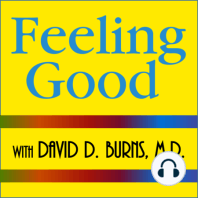84 min listen

216: Cool Questions about Should Statements!
216: Cool Questions about Should Statements!
ratings:
Length:
67 minutes
Released:
Nov 16, 2020
Format:
Podcast episode
Description
Ask David featuring four terrific Should questions, and more questions about “asinine, stupid, narcissistic, self-serving humans! “ Oliver asks: Can a thought be thought as moral or immoral? Vincent asks: I have suffered from depression for about 3 years and say to myself, "I should have gotten better sooner." Isn't this "should" appropriate? Charles says: Your concept of “no self” shot my anxiety way up and made me feel hopeless. . . . It makes me feel worse than before! Michelle asks: How is your requirement that new patients must agree to not make any suicide attempts for the rest of their lives any different to a “suicide contract” which you mention are not effective? Brian asks: I’ve done a few things that made me feel intensely guilty. . . . The knowledge that I didn’t do what I should have done led to a lot of guilt and shame, and eventually depression. Just wondering your thoughts on this Carrel asks: I'm a Democrat in Texas. How can we use disarming to heal the political rifts in our country? Natasha asks: How do I stop the dark thoughts of wishing harm to come to stupid humans who do asinine, narcissistic, self serving, irresponsible things—like driving massive, loud pickup trucks around the neighborhood, honking incessantly as they wave their 20 ft political flags; or bringing the family for a paddle boat ride in the local pond, taking delight in teaching their human offspring to paddle the boat as quickly as they can to chase after the beautiful, innocent geese and ducks trying earnestly and fearfully to swim to safety. and more. Dear Dr. Burns, Can a thought be thought as moral or immoral? In many podcasts and articles, you use "Thou Shalt Not Kill" to demonstrate morally should statement, which is one of the 3 valid should statements in English. I'm still somewhat confused about this concept. To tell you where I get stuck, I come up with three thought experiments. Imagine the following situations in which a should statement may come to mind: Situation 1 Lisa stole some money from a grocery store. When arrested by police, Lisa said with tears, "I shouldn't have stolen money. I feel ashamed for what I have done." In this case, it is obvious that "I shouldn't have stolen money" is a morally should statement, and also a legally should statement, because Lisa did something that violates the law and her moral principle. DAVID’S COMMENT: YES, YOU ARE CORRECT. LISA’S STATEMENT CAN BE CLASSIFIED AS A LEGAL SHOULD AND A MORAL SHOULD. Situation 2 One day, Bob went to Walmart to buy a suit. When he was passing by a shelf, a thought appeared in her mind. "What would happen if I steal this suit? I really want it, but I have very little money." When he came back home, he talked to himself," I shouldn't have felt the urges to steal things. And I shouldn’t have thought about stealing the suit." DAVID’S COMMENT: THESE WOULD NOT BE CONSIDERED VALID SHOULD STATEMENTS BY MOST PEOPLE, SINCE WE HAVE FREEDOM OF THOUGHT. HUMAN BEINGS HAVE ALL KINDS OF FANTASIES AND URGES ALL THE TIME—AT LEAST I KNOW THAT I DO! AN URGE ONLY BECOMES IMMORAL OR ILLEGAL WHEN YOU ACT ON IT. HOWEVER, ALTHOUGH I DO NOT THINK THESE ARE VALID SHOULDS, BUT I TRY NOT TO IMPOSE MY VALUES ON OTHERS FOR THE MOST PART. I AM A SHRINK, SO I WORK WITH PEOPLE WHO ARE ASKING FOR HELP. FOR EXAMPLE, PEOPLE WITH OCD OFTEN PUNISH THEMSELVES JUST FOR HAVING “FORBIDDEN” THOUGHTS, FEELINGS, OR URGES. THE FIGHT TO CONTROL THEM IS THE ACTUAL CAUSE OF THE OCD. THE SHOULDS TYPICALLY MAKE THE PROBLEM WORSE, NOT BETTER. SELF-ACCEPTANCE CAN BE ONE OF MANY HELPFUL TREATMENT STRATEGIES. RELIGION CAN SOMETIMES BE A SOURCE OF OPPRESSIVE SHOULDS, ESPECIALLLY THE MORE FUNDAMENTALIST TYPES OF RELIGION. RIGIDITY MAY BE A PARTIALLY INHERITED TRAIT. FOR EXAMPLE, MANY RELIGIONS AROUND THE WORLD PROMOTE THE IDEA THAT HOMOSEXUALITY IS “WRONG” AND THAT PEOPLE “SHOULDN’T” HAVE URGES AND ATTRACTIONS TOWARD PEOPLE OF THE SAME GENDER. THIS IS AN AREA WHERE “SHOULD STATEMENTS” BECOME HIGHLY CONTROVERSI
Released:
Nov 16, 2020
Format:
Podcast episode